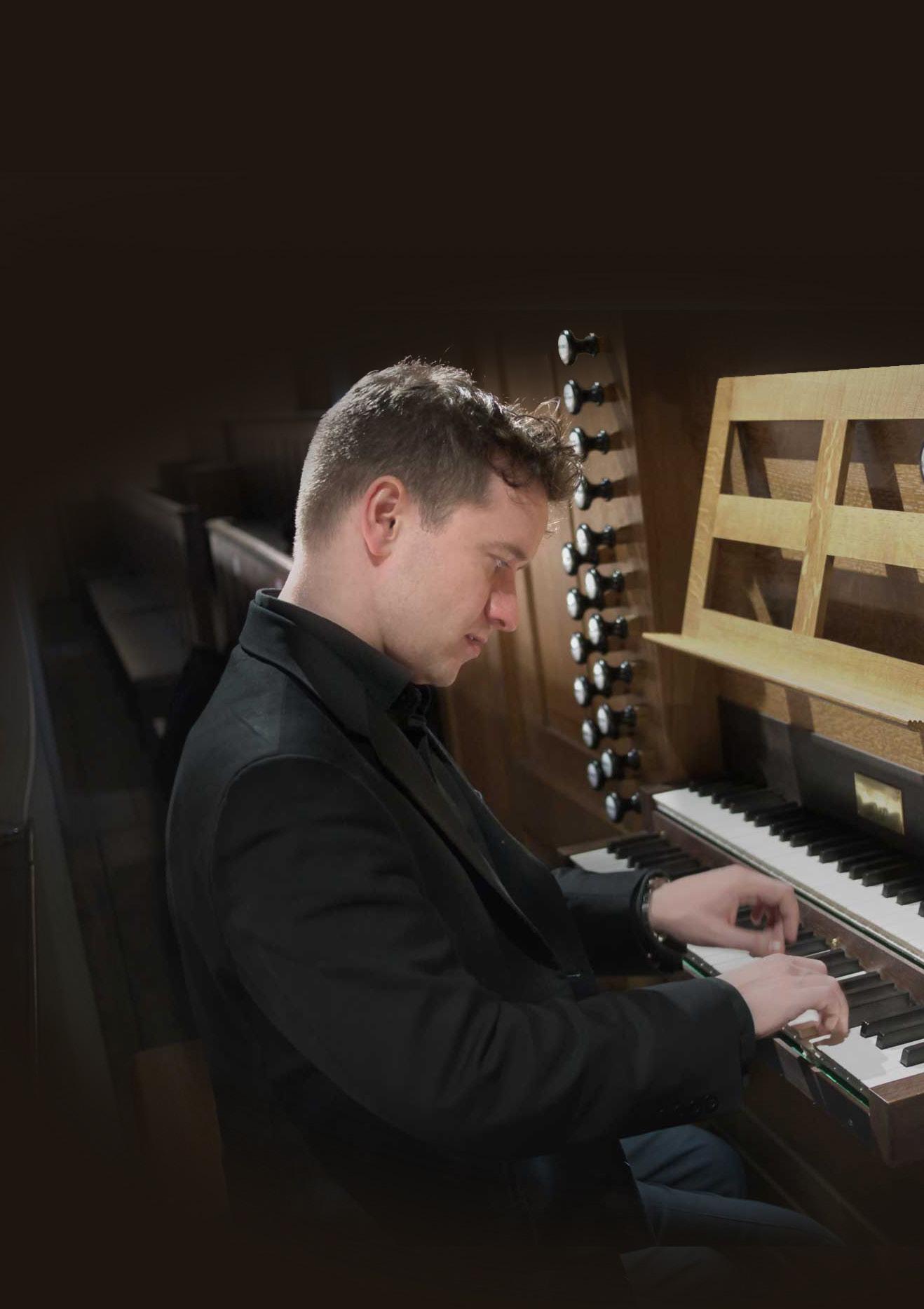DANIEL MOULT –ORGAN RHYTHM

5 Mar 2023, 4pm Victoria Concert Hall
Sponsored by Supported by

PROGRAMME
Daniel Moult organ
J.S. BACH
Toccata and Fugue in C major, BWV 566a
MENDELSSOHN
Theme and Variations in D major
MOZART
Fantasia in F minor, K. 608
THALBEN-BALL
Variations on a Theme by Paganini for Organ Pedals
PERCY WILLIAM WHITLOCK
Folk Tune from Five Short Pieces
BRITTON
Variations on Gershwin’s I Got Rhythm
CONCERT DURATION: approximately 1 hour (with no intermission)
Masterclass with Daniel Moult:
Sat, 4 Mar 2023, 3pm at Victoria Concert Hall
To register, please visit singaporeago.org
DANIEL MOULT
organ
Daniel Moult, “one of the finest organists of our time” (The Organ), is an acclaimed concert organist, film presenter and recording artist. His musicianship has been praised as “exhilarating” (Gramophone), “dazzling” (The Organ), and “formidable” (Organists’ Review). Based in London, he is the Head of Organ at the Royal Birmingham Conservatoire, and leads masterclasses, workshops and courses around the world.
As a soloist, Daniel performs regularly throughout the UK, Europe, Asia and Australia. He has pioneered the use of film as a means of promoting organ music, and is the presenter and performer on the massive sixdisc boxset, The English Organ. This is a history of instruments and repertoire that spans 500 years and 33 locations: it was released internationally at Christmas 2019. He has two further DVDs to his credit, and has also appeared as a soloist, concerto and ensemble player on many CDs, including Signum Classics' Handel at Vauxhall.
Daniel was born in Manchester and studied at Oxford University and the Amsterdam Conservatorium. He has published several editions, including two organ anthologies for Bärenreiter. He broadcasts frequently on BBC television and radio and has recorded for various record labels including Fugue State, Signum, Regent and Sony BMG.
www.danielmoult.com
PROGRAMME NOTES
When we think of the organ, we think of Johann Sebastian Bach – the greatest composer for the instrument, and if legends are true, one of the greatest performers of all time, too. His Toccata and Fugue in C major is a piece written in his earlier years, possibly as a young man whilst he visited Buxtehude in the city of Lübeck. Two free sections alternate with two fugues – the first fugue lively and straightforward (the so-called German spielfuga), and the second bringing the work to a majestic and commanding conclusion.
Bach was a huge source of inspiration to Felix Mendelssohn, although the Theme & Variations we hear today owes everything to Mendelssohn’s own style and lyrical invention. The melody at the outset is of his own composing, and the whole work combines this song-like quality with his inimitable keyboard figurations.
Whilst Wolfgang Amadeus Mozart famously called the organ “the king of instruments”, he left barely any original solo music for the organist! His most famous organ work, the Fantasia in F minor was written for a large barrel organ which could be played without the need of a musician. The outer sections of the fantasia are fugal, and perhaps it is no coincidence that Mozart was copying out Handel (a famous fugue writer) at the time of the work’s conception. The middle section, however, is a beautiful Andante with a charming set of variations, which grow organically: there is a clear parallel here with his piano variation sets.
Moving to a very different musical world, the highly demanding and virtuosic Variations on a Theme by Paganini for pedals (where the hands enter only in the final two of ten variations) have become a popular audience sensation. The celebrated English organist Sir George ThalbenBall composed them for a tour to the United States of America. The variations explore every possible technique of pedal playing, and require loose ankles and a cool head!
Over the last hundred years, English organ culture has absorbed jazz and popular idioms, especially during the cinema organ explosion of the 1920s and ‘30s. Percy Whitlock explored lighter music during his role as organist at Bournemouth Pavilion, although his short, wistful Folk Tune is redolent of the pastoral melodies which so inspired his teacher, Ralph Vaughan-Williams. We hear unabashed jazz influences in the Variations on Gershwin’s I Got Rhythm by Harold Britton, where George Gershwin’s famous melody is treated in many different textures and idioms. It seems worlds apart from the J.S. Bach and Mozart earlier on in our concert, reminding us of the constantly evolving and highly varied facets of the organ repertoire.
Programme notes by Daniel Moult
PATRON SPONSOR SUPPORTED BY sso.org.sg/ VCHpresents VCHhomeofthesso VCHpresents



